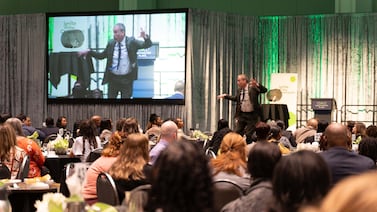More than one-third of New York City’s preschool children with disabilities did not receive all of the extra support they’re entitled to in the last school year, according to a report released Tuesday morning.
The report, by advocacy organization Advocates for Children New York, analyzes the most recently available city data for the 2021-22 school year. The figure represents an increase from the 2020-21 school year, when 30% of children, or about 7,800, didn’t receive all of their required services.
The data means that a child may have received some of their required speech therapy, for example, but no required physical therapy — services that are spelled out in an individualized education program, or IEP.
Among the 9,800 children — or close to 37% — who didn’t receive all of their required services:
- About 6,500 children who required speech therapy — or about a quarter of children who needed monolingual speech therapy and a third of children who required bilingual services.
- Nearly 28%, or 5,300 children, who required occupational therapy.
- About 2,000 children, or nearly 26%, who needed physical therapy.
The report showcases a yearslong problem with the city’s public preschool system, which serves 3- and 4-year-olds: Programs struggle to provide all children with the services they need, as they are legally required to do. Young children’s access to these services might be more crucial now, since some of these students may have missed out on necessary services as infants and toddlers early in the pandemic, like tens of thousands of kids nationally.
The greatest disparity in who received services was based on language: Sixty-nine percent of children who required only English instruction received their services, versus 53.5% of those who needed to be taught in another language.
The racial and socioeconomic disparities were smaller. While 69% of white students fully received services, the same was true for 67% of Hispanic children, 65.5% of Black children, and 62% of Asian children. Sixty-seven percent of permanently housed students received services, versus 61% of homeless children.
The city’s data might actually “significantly” underreport the problem, the report said. The education department considers a child “fully served” if they received at least one session of all of their required services, the report said.
“A child whose occupational therapist quits in November and is never replaced, or a preschooler who waits six months for mandated speech therapy to begin because the DOE is unable to find a provider, is not fully served from the perspective of their parents and teachers, but they are left out of the counts above,” the report said.
In December, Mayor Eric Adams vowed to open hundreds of additional seats for preschool children with disabilities to ensure that all children get the seats that they’re entitled to. Advocates have praised that commitment, but it already is being tested. While the city has opened 700 new seats this school year for students with more challenging disabilities, about 300 preschoolers are still waiting for a spot, the report noted.
Having access to seats is a perennial issue. Last year, just over 1,000 preschool children who required a small special education class did not have access to those seats by the end of last school year, according to the report.
“We agree with the concerns of our parents and advocates that for far too long students with disabilities were excluded from programming and services,” Nicole Brownstein, a spokesperson for the city’s education department, said in a statement. “This administration is committed to righting this wrong.”
But the city’s commitment to open more seats doesn’t address the ongoing shortage of staff who can provide extra required services for these children, one significant reason why children are missing out on services, said Betty Baez Melo, director of the Early Childhood Education Project at Advocates For Children. The city contracts with outside organizations to provide many of these services, so Advocates For Children is calling on Adams to spend another $50 million to increase pay for those service providers and hire their own staffers.
Brownstein noted that the education department has expanded its own teams who provide services to preschool children, including hiring an additional 24 speech therapists, 23 occupational itinerant therapists, and 12 physical therapists.
The $50 million request from Advocates For Children would also go toward speeding up evaluations for children, another weak area the report cited. Nearly 16% of children, or 1,974, who were eligible for preschool special education services waited more than 60 days — the legal deadline — for a meeting to determine what extra services they should receive, according to the organization. That’s a similar rate to last school year.
Over the last three years, the education department has opened 21 Preschool Regional Assessment (PRAC) teams, which provide evaluations in addition to state-approved agencies that the city contracts with. This school year, staffers on PRAC teams had the option of working overtime, allowing more students to get evaluated — something they plan to do again next school year, officials said.
Still, education department officials said there are not enough agencies to meet the evaluation needs of preschool students, as more children have been referred for services since the pandemic. They plan to work with city, state, and federal government officials to ensure there’s enough funding to link students with necessary services.
While data for this school year is not yet available, the organization reported that it’s received many calls from families who have struggled to access services for their young children. One of those calls was from Terese, a mother in the East Flatbush neighborhood of Brooklyn who asked to use her first name only for privacy reasons.
Her 4-year-old son required the help of a special education itinerant teacher, or an SEIT, who helps children like hers with disabilities inside of a general education preschool class. But in February, that teacher left her son’s preschool with no replacement.
Terese spent a month emailing the main special education contact in her district about a replacement teacher with no response, even taking days off work to deal with the issue, she said. Meanwhile, her son was talking less at home.
“The teacher started reporting to me that he was not communicating in the classroom,” Terese said.
Terese’s problem was not unique. According to the report, roughly 1,300 preschoolers, or nearly one in five children did not have an SEIT all last school year, even though their IEP required one.
Eventually Terese contacted Advocates For Children, which advised her to lodge a complaint through 311. After that, a special education official with her district responded, blaming the lack of a teacher on a staffing shortage. By mid-May, her son once again had an SEIT, she said.
“I felt all alone,” Terese said. “The DOE just left me to fend for myself with my child with special needs.”
Reema Amin is a reporter covering New York City public schools. Contact Reema at ramin@chalkbeat.org.







